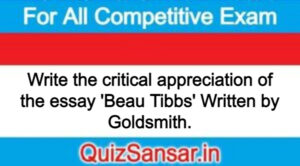
Write the critical appreciation of the essay ‘Beau Tibbs’ Written by Goldsmith.
Write the critical appreciation of the essay ‘Beau Tibbs’ Written by Goldsmith.
Ans.
The essay Beau Tibbs is most significant collection of the essays by Oliver Goldsmith. It is a collection of those essays which deal with the character of the peculiar persons and thus teaches so many important practical les sons for a graceful and successful life. The present essay has portrayed the character of one Mr. Tibbs. The essayist calls him a Beau which he has added as an adjective to his real name. This word indicates the inherent character of Mr. Tibbs that he was an elderly man who always remained particular to his dress and also pays unnecessary attention to women. He presumes that they are chasing him in large number all the time and in that society of the eighteenth century, such people were called dandies. So the word Beau has been used sarcastically to show the levity of his character.
Mr. Tibbs was very poor man but he always tried to conceal it from others, though unsuccessfully. The writer remarks, “Heaven has made him poor; and while all the world perceives his wants, he fancies them concealed from every eye.” This habit of Mr. Tibbs had made him an eccentric and he had developed a very ridiculous nature. Whenever, he met someone, he boasted of his high contacts. He was equally peculiar in his dress. When the essayist met him, he noticed that “his looks were pale, thin and sharp; round his neck hi wore a broad black ribbon and in his bosom a buckle studded with glass…and his stockings of silk, though newly washed, were grown yellow by long ser vice.” He was habitual of dressing himself peculiarly and variously, some times in torn and at other times in beautiful dress.
His boastful nature was he greatest weakness of his character. He always tried to impress others that he had very close contacts and familiarity with the Lords and ladies of high status and often dined with them in the cities and towns privately. He was too proud to admit his poverty and boasted of being on close terms with aristocracy. He foolishly thought that the people believed whatever he told them about himself. Charles praised him for his taste of dress and he at ones proudly reacted. “an intimacy with the great will improve one’s appearance.” He declared that he hated with the Duchess of Piccadilly and the Lord himself addressed him a Ned which indicated their intimacy. he also boasted that the girls and women poached him and followed him all the time.
Goldsmith has revealed his character in an extremely humorous but sarcastic manner. When he started talking with Charles, as his habit was, he started relating the stories of contacts. He told the Lord has granted him the favour of offering five hundred a year and ” His lordship took me down in his own chariot yesterday, and we had a tete-a-tete dinner in the country where we talked of nothing else.” Then at once, as if suddenly reminded, he tells that he had actually dined in the town. He was among the select party to dine at Lady Grogram’s. But after talking so long about his foolish stories. he suddenly comes to his real self. he askes Charles to give him only half-a-crown. Tibbs did this with everybody he meets and thus earns his livelihood in a way, by begging from his acquaintances, he tells. “ask me for it the next time we meet, or it may be twenty to one but I forget to pay.” In fact, he never repaid the money he borrowed from his friends and they also knew this fact very well. through his character, Goldsmith has imparted a very useful advice to the young people who depended on the mercy of others but always thought themselves very clever. In their youth. their friends did not mind much and help them but they suffer a lot in their advanced age when their levity fails to help them. “When age comes on, the gravity of which is incompatible with buffoonery. then he will find himself forsaken by all. condemned. In the decline of life. to bang upon some rich family whom he once despised.” All their so called friends and well wishers leave them alone and they have to serve in those very families which they professed to hate and “to be employed only as a spy upon the servants, or a bug bear to fright children into duty.” He advised that such hypocrisy is always damaging and we should save ourselves from such an evil. When the people know their real nature, everybody not only avoids them but also runs away from them as Charles had done in the park when he saw Tibbs them. How ridiculous is the behaviour of Charles to search for some place of safety “the person who he attempted to escape. hunted us through every doubling…at last we fairly stood still, resolving to face what we could not avoid.”
-
Write the critical appreciation of the poem No. 12 entitled Far Below Flowed.
-
Write the critical appreciation of the poem No. 11 entitled Leave this Chanting.






